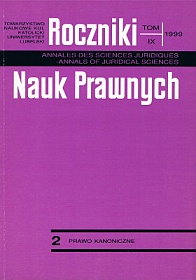The Tasks of the College of Consultants in the Situation sede plena in the Codex Juris Canonici of 1983
Abstract
Having outlined the genesis of the institution of the college of consultants, the author went on to discuss its competence, as they are included in the resolutions of CJC/1983 and the Polish particular law, in the situation sede plena. Under normal circumstances of the episcopal see, the tasks of the college of consultants are the following: to give counsel and consent, to replace the sacerdotal board and assist at taking the office by the bishop coadjutor.
The diocesan bishop was obliged to seek advice in three cases: 1) before appointing a diocesan economist (can. 494 §1); 2) before his removal from the office (can. 494 §2); 3) before taking acts of management of a greater importance with regard to the material state of the diocese (can. 1277).
The diocesan bishop is obliged to obtain consent from the college of consultant before the following acts:
- Before giving permission to alienation as regards the goods which constituted a permanent acquired estate of the legal person subordinate to the diocesan bishop or diocesan foundation. Their values extends the sum defined in the law (can. 1277 and 1291);
2. To start the act of the alienation of the goods whose value is placed within the minimum and maximum of the sum established by the conference of bishops belonging to the legal public person. The latter is not subordinate to a given diocesan bishop, when the statutes of that person do not point at a competent church authority, and in the case of the alienation of the diocesan goods (can. 1292 §1);
3. Before the alienation of any goods whose value extends the highest sum established by the conference of bishops, or when we deal with the objects given to the Church by means of a vow, and the valuables due to artistic or historical reasons (can. 1292 §2);
4. Before any transaction due to which the estate of the legal person may be in a worse situation (can. 1295).
All the above mentioned cases deal with the administration of the church estate, defined in the law as an extraordinary administration (administratio extraordinaria). This administration is connected with a particular responsibility of the archdiocesan bishop.
In the Polish particular law the tasks of the college of consultants define the following: The Resolutions of the Conference of the Episcopate of Poland as regards the Sacerdotal Boards and the College of Consultants of March 23. 1983, the diocesan statutes of the college of consultants, sacerdotal boards and the statutes of the diocesan councils.
Copyright (c) 1999 Roczniki Nauk Prawnych

This work is licensed under a Creative Commons Attribution-NonCommercial-NoDerivatives 4.0 International License.


